Princess Irulan's Literary Work | The Complete Collection
A database to rival the Imperial Archives on Kaitain.
For last week’s newsletter, I went through all the Dune books to create a complete collection of the Collected Sayings of Muad’Dib - my absolute favorite in-universe book.
As I mentioned then, Dune was the first book I’ve ever seen that used epigraphs at the beginning of chapters and they always felt interesting because they provided a glimpse behind the curtain.
Well. What began as focused research into a single Irulan book, quickly spiraled into an obsession.
Do you know anyone who likes to nerd out about Dune?
I have to admit, this particular rabbit hole made me feel like I was Princess Irulan’s Princess Irulan: haunting her as she haunted Paul, trying to document every quote, every in-universe book title, and every fragment of her extensive literary output across all Dune novels.
But it’s done.
And today, I’m thrilled to share with you my most ambitious Dune project yet - a comprehensive database of Princess Irulan’s complete literary works.
Princess Irulan’s Collected Works
You can explore this database through three different Airtable interfaces.
1. Quotes - every epigraph attributed to the Princess Irulan; can be filtered by canon, Dune novels and Irulan’s books to show only the quotes you’re interested in.
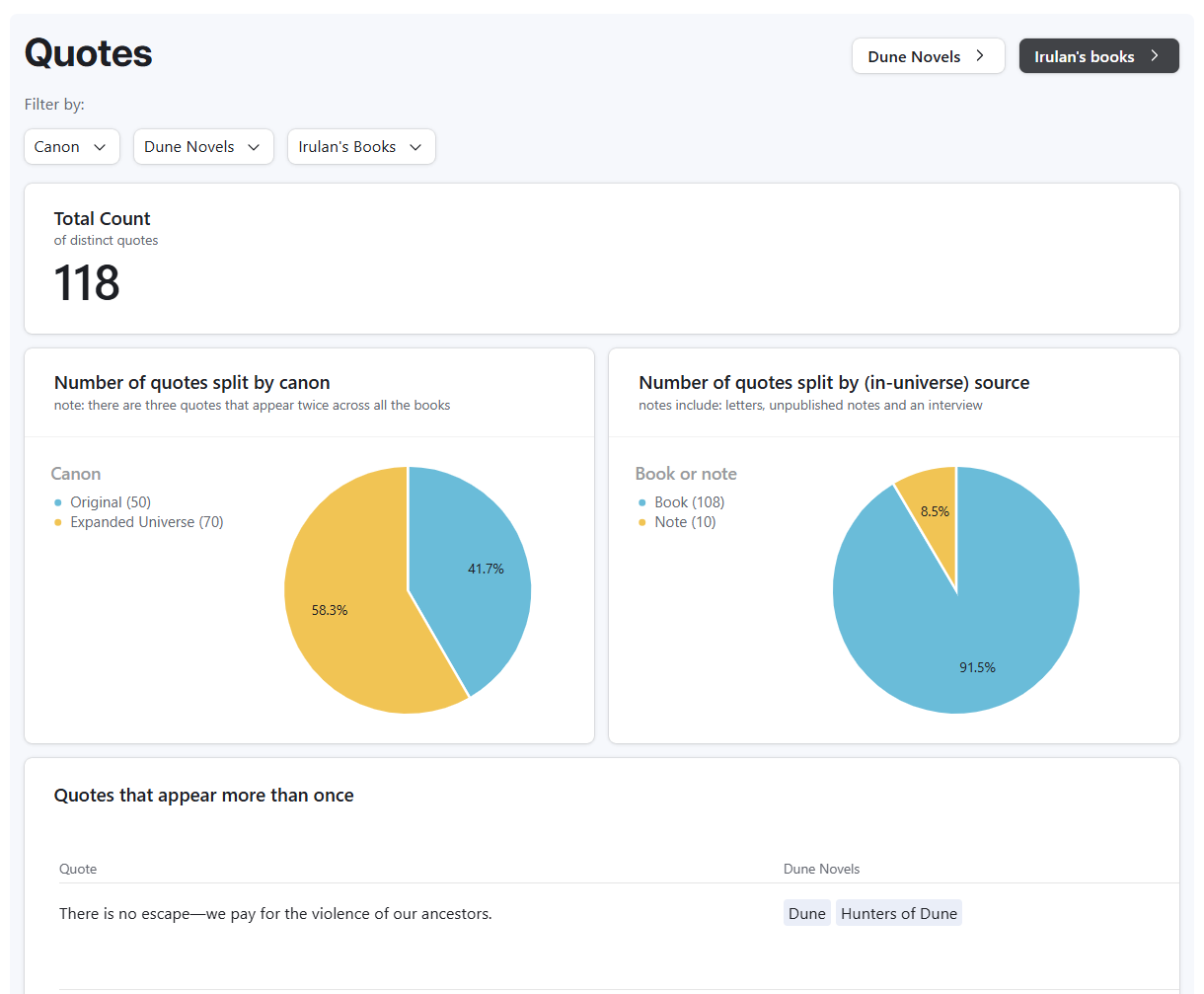
2. Irulan’s books - every book attributed to the Princess Irulan and how often they show up; can be filtered by canon and Dune novels to show only the books you’re interested in.
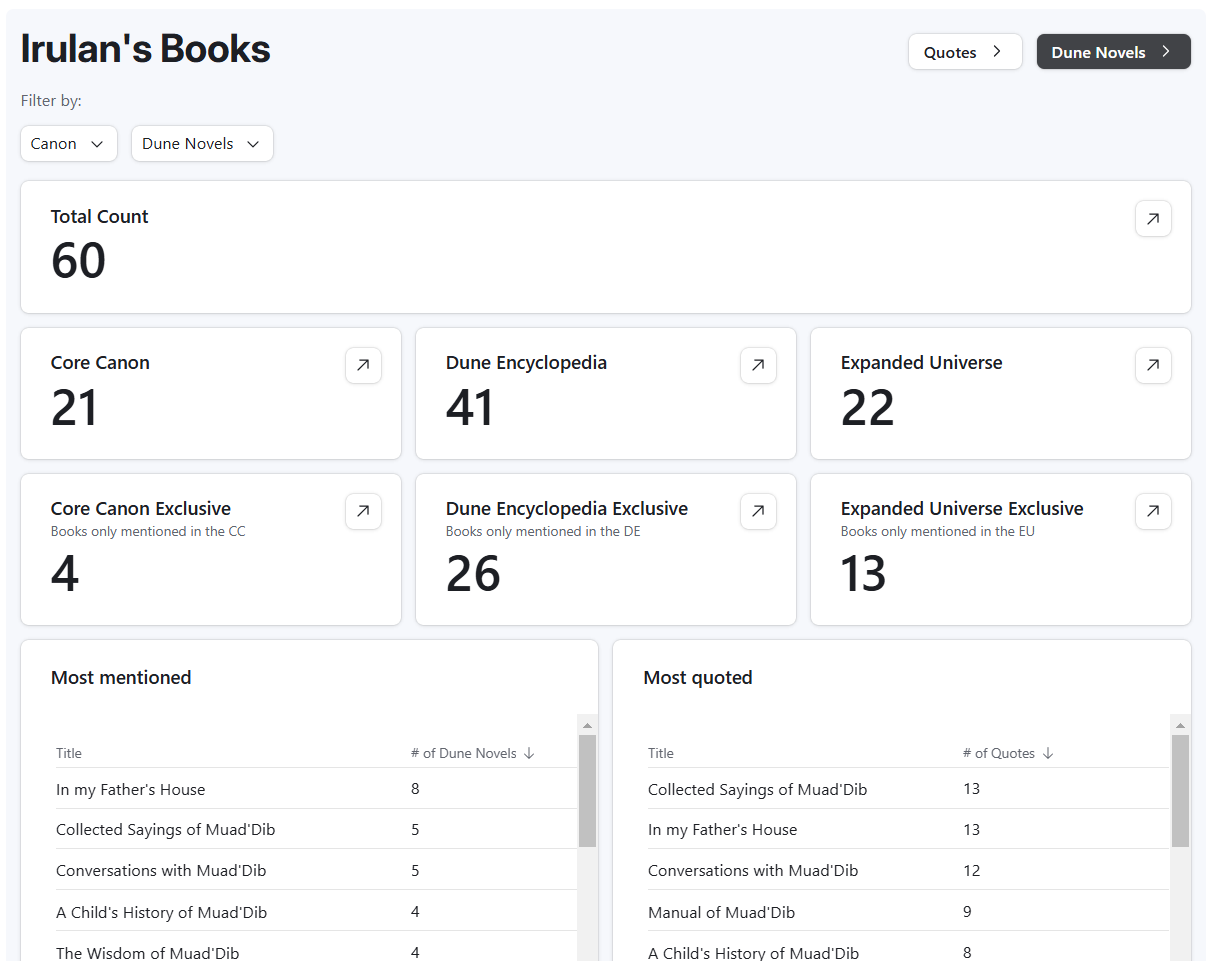
3. Dune novels - all Dune novels and how many of the in-universe books and quotes they contain; can be filtered by Canon and Irulan’s books to show only the novels you’re interested in.
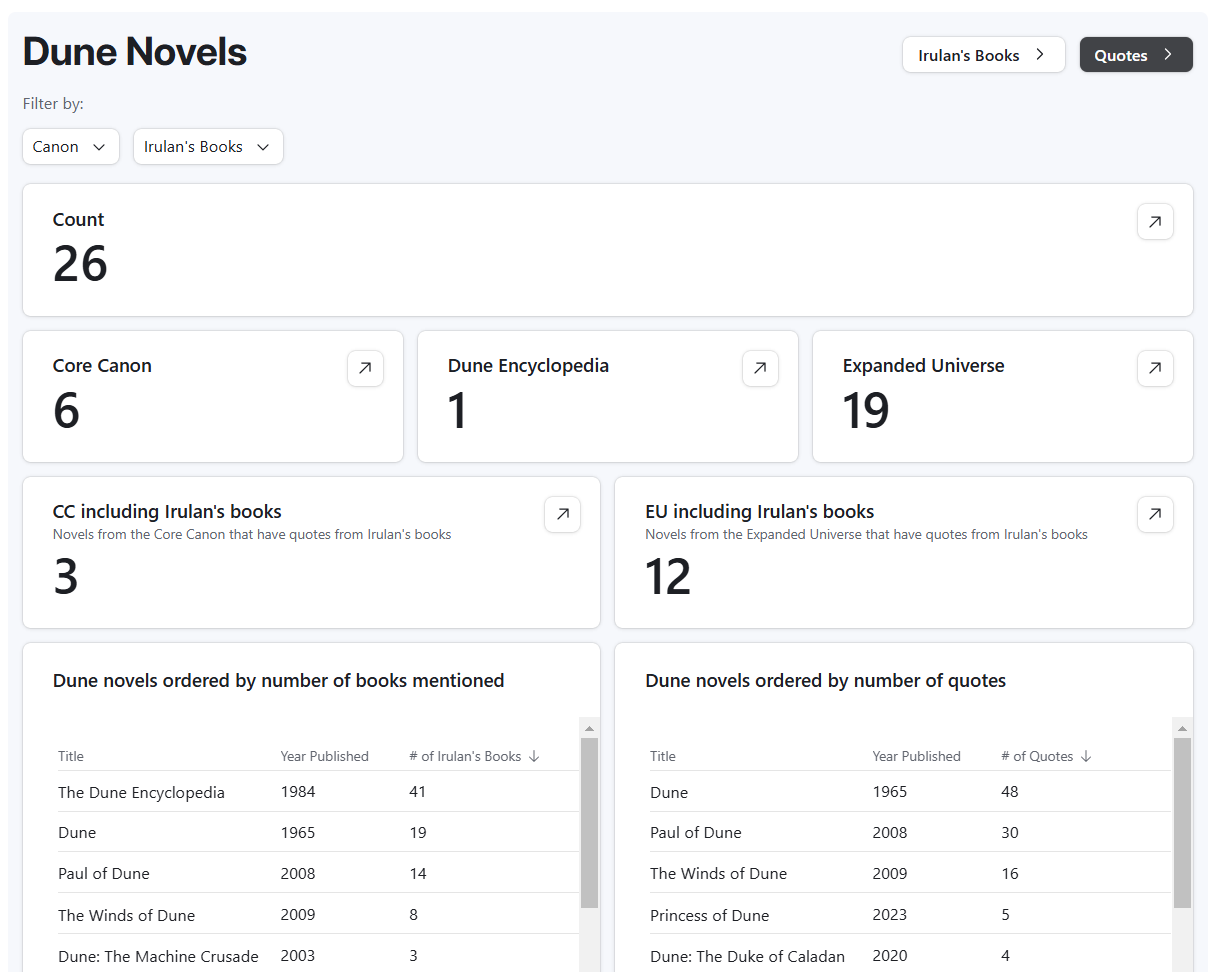
Wherever you start, you can always click over to the other two interfaces.
(This was a labor of love and I double-checked everything. Even so, there might be mistakes or errors - if you find any, please feel free to reach out.)
Highlights from the database
Dune novel with most in-universe books: the original Dune with 19 Irulan titles
(NB: the Dune Encyclopedia references 41 books but I wouldn’t call it a novel)Dune novel with most quotes from Irulan books: the original Dune with 48 quotes
The Irulan book that appears in most Dune books: In my Father’s House, appearing in 8 books.
The Irulan book with the most quotes: In my Father’s House and Collected sayings of Muad’Dib, both having 13 quotes across the canons.
There are 3 quotes that are reused and appear twice
Conversations with Muad’Dib and Muad’Dib: Conversations are indeed two separate books.
The Princess Historian’s Literary Empire
Unique Point of View
I would argue that Irulan’s books and insights are the most fascinating of all the epigraphs in the Dune novels because of the complex position she ended up in.
She was:
An imperial princess with insider access to the highest levels of power
A trained Bene Gesserit observer with analytical skills beyond most historians
Paul’s legal wife but not his lover (a political arrangement that gave her proximity without intimacy)
A political hostage whose survival depended on careful navigation of court politics
A genuine admirer of her subject, despite their complicated relationship
Irulan understood that imperial power is both magnificent and constraining - a theme that would apply equally to Paul’s reign. As she notes in In My Father’s House:
My father […] was a man fighting constantly to escape the bars of an invisible cage. You must remember that he was an emperor, father-head of a dynasty that reached back into the dimmest history. But we denied him a legal son. Was this not the most terrible defeat a ruler ever suffered?
In the same in-universe book, she provides a uniquely intimate glimpse of her father’s relationship with Duke Leto: “my father secretly wished the Duke had been his son.”
This reveals the complex web of admiration, rivalry, and regret that characterized imperial politics - qualities that would later define her own relationship with Paul.
Literary Categories
There’s a total of 60 Irulan books across all the Dune novels - 41 are mentioned in the Dune Encyclopedia, which also provides help with categorizing the Princess’ work:
Analyses – Scholarly examinations like The Dunebook and Muad’Dib: The Religious Issues
Biographies – Personal accounts including Chani, Daughter of Liet and The Humanity of Muad’Dib
Collections – Anthologies such as Collected Sayings of Muad’Dib and The Dune Gospels
Edited Texts – Works where Irulan served as compiler, like Alia’s Commentary and The Stilgar Chronicle
Histories – Broader historical narratives, notably Arrakis Awakening
Fine Writing - For example, Muad’Dib, an Island of Selfdom, which is claimed to be “one of the finest elegies ever written”
I can only echo the Dune Encyclopedia, which states that Irulan’s literary output was staggering in its breadth and depth.
Themes
As you browse through the database, sorting and filtering by different criteria, several themes emerge across Irulan’s writings.
Her writings aren’t just historical accounts - they reveal her unique perspective on power, prescience, and destiny.
First and foremost, Irulan grapples with her dual role as both historian and myth-maker. She’s acutely aware that recording history also shapes it. Through her writings, she doesn’t just document Paul’s rise - she actively constructs the legend of Muad’Dib that will outlive him. This tension between objective recording and subjective interpretation runs throughout her work.
A second prominent theme is her analysis of power’s mechanisms. Her observations on imperial politics reveal surprising insight into how power isolates and corrupts even the well-intentioned.
Irulan offers some of the trilogy’s most profound reflections on the nature of seeing the future and whether such vision liberates or traps the seer. She understands that Paul’s ability to see possible futures doesn’t simplify his choices – it paralyzes him with too much knowledge.
Finally, though not Fremen herself, Irulan proves a keen observer of desert philosophy and how Arrakis itself shaped Paul’s worldview. She recognizes how the harsh desert bred disciplines and perspectives that were alien to imperial thinking, yet crucial to understanding Muad’Dib’s approach to power.
Explore For Yourself
I encourage you to dive into the database - perhaps you’ll discover patterns I’ve missed entirely. (Again, if you find any mistakes, I’d be more than happy to correct them.)
In many ways, the readers of Dune inhabit a position similar to Irulan’s - observers fascinated by Paul’s journey, trying to make sense of its philosophical implications, its warnings about power.
I’d argue that through these writings, we better understand our own relationship to history, mythology, and truth.





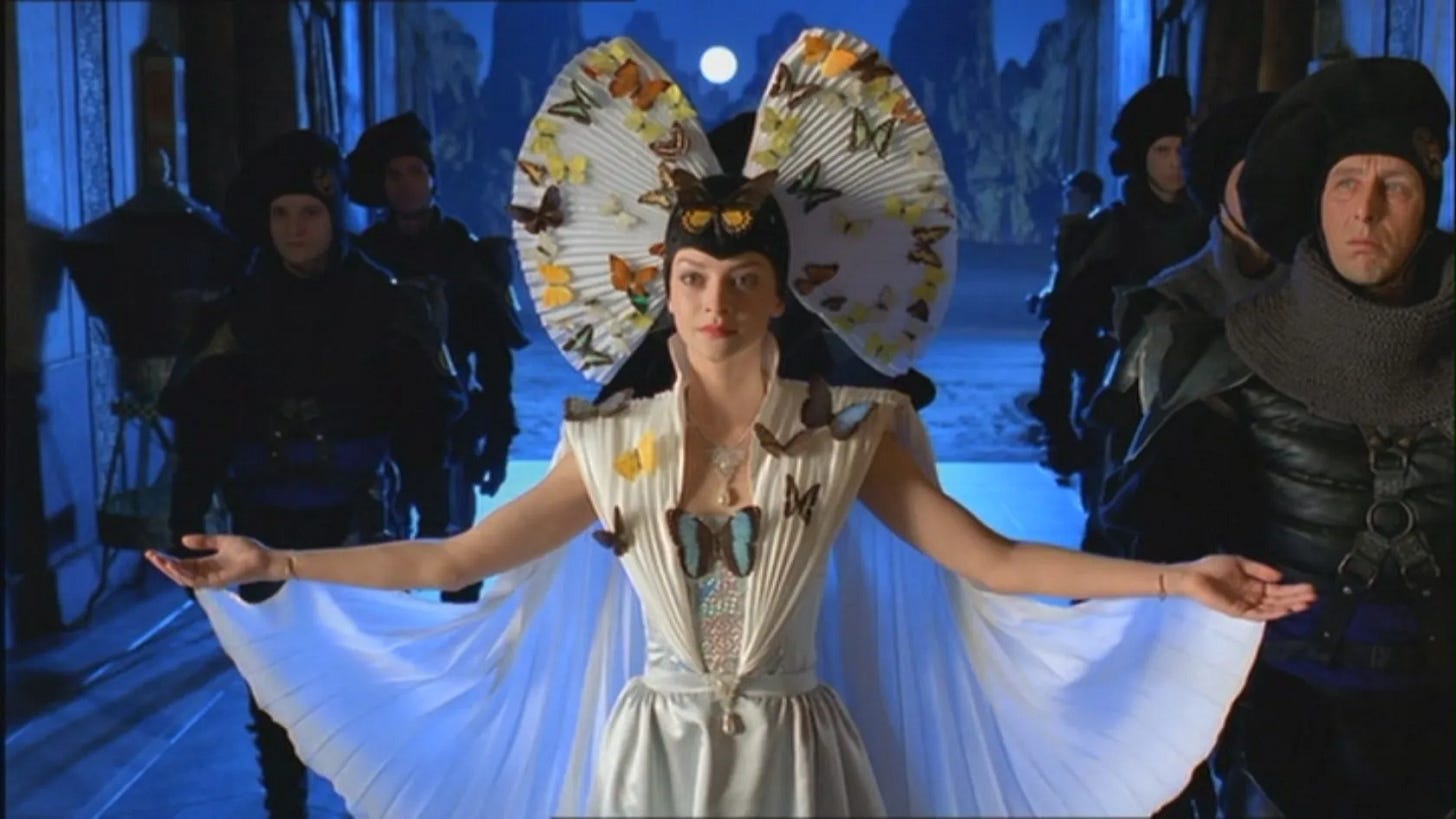
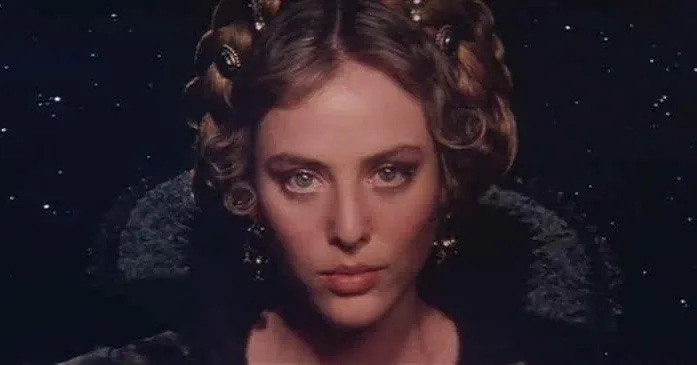
This is so rad. Thank you 👏🏻